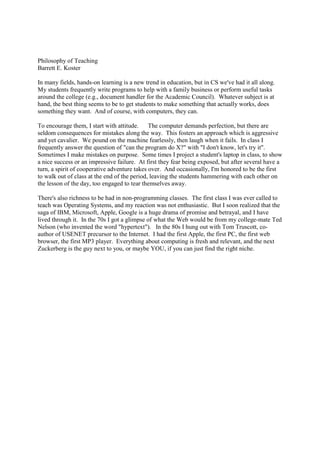Recommended
Recommended
More Related Content
Similar to teaching
Similar to teaching (20)
Math staff development techn integration presentation

Math staff development techn integration presentation
Reaching net-generation learners with social technologies

Reaching net-generation learners with social technologies
Reaching Net Generation Learners with social technologies - CDIO 2008

Reaching Net Generation Learners with social technologies - CDIO 2008
Testing in the Age of Distraction: Flow, Focus, and Defocus in Testing

Testing in the Age of Distraction: Flow, Focus, and Defocus in Testing
Pimp Your Post - Tips and Tricks for Jazzing up Intro Posts in Online courses

Pimp Your Post - Tips and Tricks for Jazzing up Intro Posts in Online courses
Making it big in software (ibm post doctoral fellow symposium keynote slidesh...

Making it big in software (ibm post doctoral fellow symposium keynote slidesh...
teaching
- 1. Philosophy of Teaching Barrett E. Koster In many fields, hands-on learning is a new trend in education, but in CS we've had it all along. My students frequently write programs to help with a family business or perform useful tasks around the college (e.g., document handler for the Academic Council). Whatever subject is at hand, the best thing seems to be to get students to make something that actually works, does something they want. And of course, with computers, they can. To encourage them, I start with attitude. The computer demands perfection, but there are seldom consequences for mistakes along the way. This fosters an approach which is aggressive and yet cavalier. We pound on the machine fearlessly, then laugh when it fails. In class I frequently answer the question of "can the program do X?" with "I don't know, let's try it". Sometimes I make mistakes on purpose. Some times I project a student's laptop in class, to show a nice success or an impressive failure. At first they fear being exposed, but after several have a turn, a spirit of cooperative adventure takes over. And occasionally, I'm honored to be the first to walk out of class at the end of the period, leaving the students hammering with each other on the lesson of the day, too engaged to tear themselves away. There's also richness to be had in non-programming classes. The first class I was ever called to teach was Operating Systems, and my reaction was not enthusiastic. But I soon realized that the saga of IBM, Microsoft, Apple, Google is a huge drama of promise and betrayal, and I have lived through it. In the 70s I got a glimpse of what the Web would be from my college-mate Ted Nelson (who invented the word "hypertext"). In the 80s I hung out with Tom Truscott, co- author of USENET precursor to the Internet. I had the first Apple, the first PC, the first web browser, the first MP3 player. Everything about computing is fresh and relevant, and the next Zuckerberg is the guy next to you, or maybe YOU, if you can just find the right niche.
